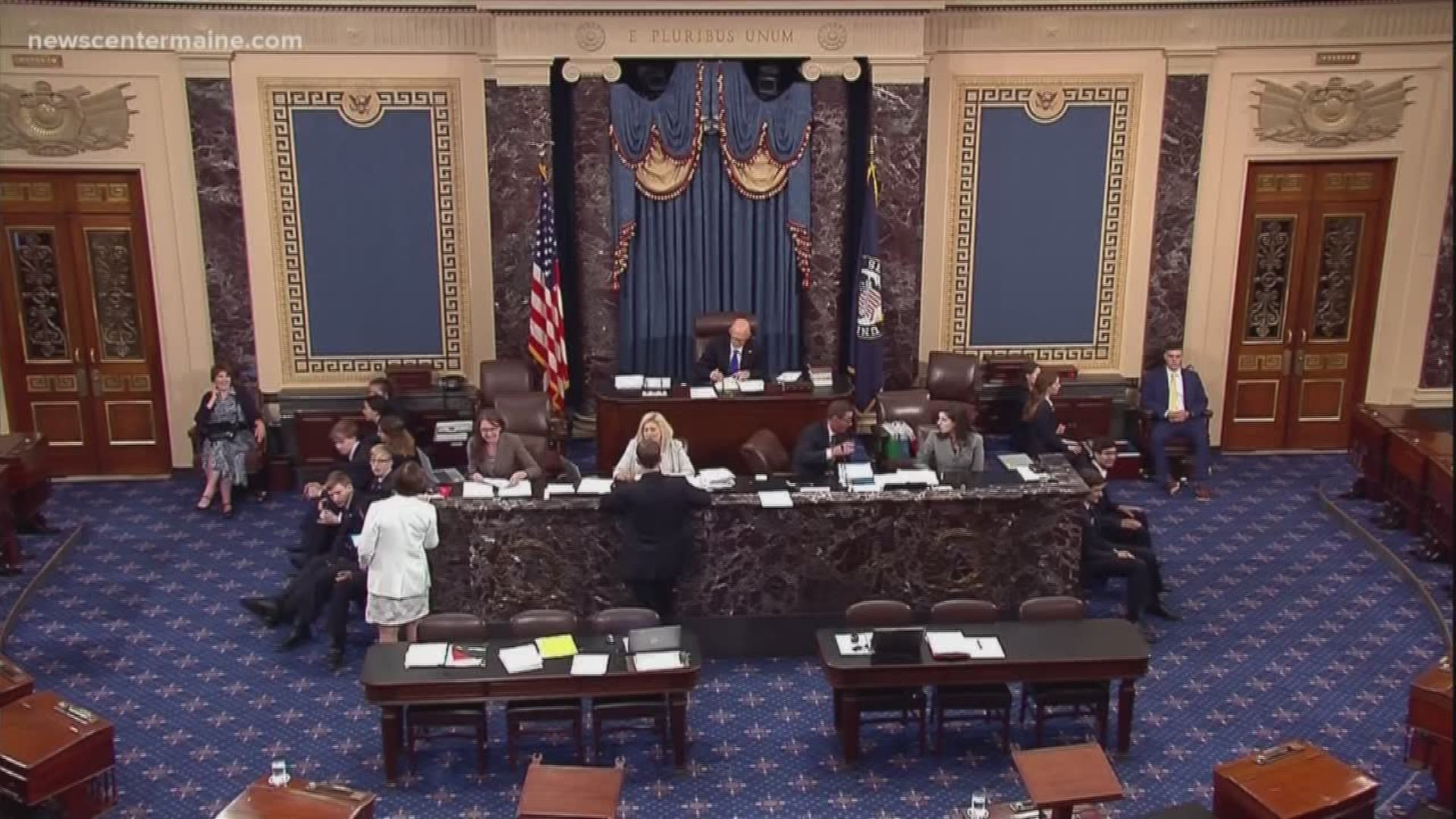PORTLAND, Maine — Republican Sen. Susan Collins on Tuesday took her 7,000th consecutive vote as a member of the U.S. Senate, extending a streak she has carefully maintained during more than two decades in the Senate.
The 66-year-old Collins is gearing up for a reelection race in 2020 that is expected to be competitive. She's New England's only Republican senator, and her extensive voting record, while an accomplishment, also gives her opponents ample ammunition. Collins says the streak shows her commitment to the job.
"Even in this toxic atmosphere, showing up for work, making sure Maine is represented, and casting every vote, that's something that people can relate to. They work hard. They expect their members of Congress to work hard, too," Collins told The Associated Press.
Democrats are hoping that one vote in particular will come back to haunt Collins: her support last year for Supreme Court Justice Brett Kavanaugh. Collins praised Kavanaugh as qualified and said the sexual assault allegations against him were uncorroborated. Kavanaugh denied the allegations.
RELATED: Call to boycott Maine hits social media after Collins vote for Kavanaugh
RELATED: Passion vs. Principle: Sen. Collins stands firm after controversial, historic vote sparks outrage
RELATED: 'I will not be intimidated.' Senator Susan Collins says she made the right decision on Kavanaugh
Since then, several Democrats have been eyeing a challenge to Collins, encouraged by the nearly $4 million in crowdsourced money that was raised by her critics. Democratic lobbyist Betsy Sweet, a failed candidate for governor, announced last week that she's running — and she won't be the last.
Sweet accused Collins of failing to stop other conservative judicial nominations at a time when abortion rights and Roe vs Wade are under attack. She said Collins' vote for Kavanaugh was a "gut punch" for Maine women. "People are looking for something different for the first time in a long time," she said.
Collins, often seen as a bridge between the parties, said she's kept the same vetting process for judges under both Democratic and Republican presidents since taking office in 1997. She said she can support a candidate who's willing to put the law first, ahead of personal views.
But there are limits. She's opposed to one of Trump's federal judicial nominees, Matthew Kacsmaryk of Texas, saying he's made "some outrageous comments" about LGTBQ individuals and Roe vs Wade.
When it comes to the voting streak, Collins has looked to a female mentor, the late Republican Sen. Margaret Chase Smith of Maine, who never missed a roll call for 13 years until being sidelined by surgery.
Smith was popular during her era. Known for her "Declaration of Conscience" speech that decried McCarthyism, Smith was the first woman to serve in both the U.S. House and the U.S. Senate, and she was the first woman to be placed in nomination for the presidency at a major party's convention. Nonetheless, she was eventually voted out in 1972 by a Democrat who accused her of being out of touch.
Collins hasn't formally announced that she'll seek re-election. She said she expects that to announce her decision in the fall. But she's already fundraising, and had nearly $4 million in campaign cash after the last reporting period.
Keeping the perfect voting record intact hasn't been easy.
Collins is careful to schedule flights back to Washington on Sunday nights, to give her some wiggle-room in the event of a canceled flight.
She scheduled her wedding during the August recess in 2012, just to be safe. Senate leadership, respectful of her voting streak, last year scheduled no votes when she was in Maine for her father's funeral.
Another time, she twisted her ankle racing, in heels, to a vote when then-Senate Majority Leader Harry Reid, a Democrat, ordered a roll call while she was in a Homeland Security Committee meeting. Committee members were told that the vote was being held open, but Collins ran anyway.
Democratic Sen. Chuck Grassley of Iowa has a longer voting streak, at 8,446, even though he can't boast perfect voting record like Collins. "It's pretty impressive when you can stand in a town meeting in Maine and say I've never missed a vote since I've been in the U.S. Senate. By inference, she takes her job seriously," Grassley said.
While Grassley's and Collins' voting streaks are lengthy, they fall shy of high-water mark set by the late Wisconsin Democrat William Proxmire. He had 10,252 consecutive votes from April 20, 1966, to Oct. 18, 1988.

